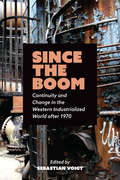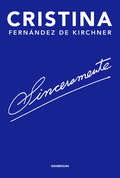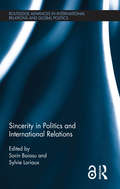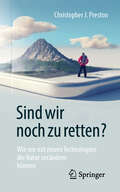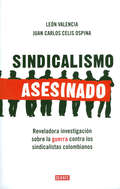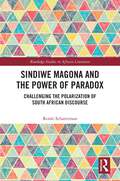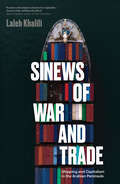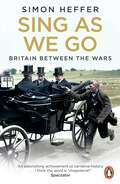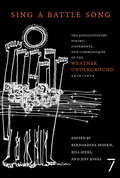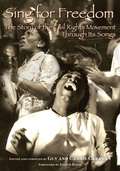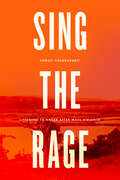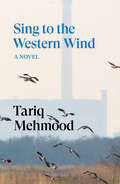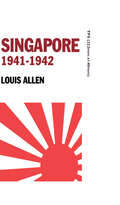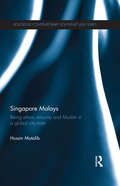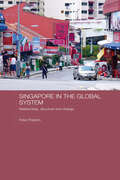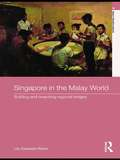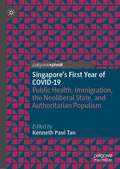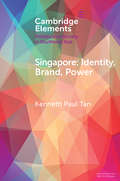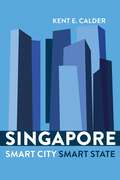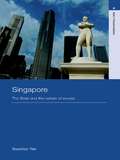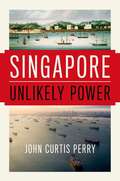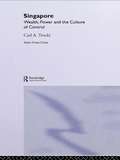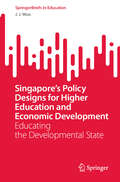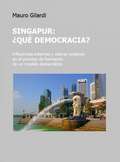- Table View
- List View
Since the Boom: Continuity and Change in the Western Industrialized World after 1970 (German and European Studies)
The 1970s are of particular relevance for understanding the socio-economic changes still shaping Western societies today.The collapse of traditional manufacturing industries like coal and steel, shipbuilding, and printing, as well as the rise of the service sector, contributed to a notable sense of decline and radical transformation. Building on the seminal work of Lutz Raphael and Anselm Doering-Manteuffel, Nach dem Boom, which identified a "social transformation of revolutionary quality" that ushered in "digital financial capitalism," this volume features a series of essays that reconsider the idea of a structural break in the 1970s. Contributors draw on case studies from France, the Netherlands, the UK, the US, and Germany to examine the validity of the "after the boom" hypothesis. Since the Boom attempts to bridge the gap between the English and highly productive German debates on the 1970s.
Sinceramente
by Cristina Fernández de Kirchner«Este libro no es autobiográfico ni tampoco una enumeración de logros personales o políticos, es una mirada y una reflexión retrospectiva para desentrañar algunos hechos y capítulos de la historia reciente y cómo han impactado en la vida de los argentinos y en la mía también.» Del amanecer sin dolor el día después de dejar la Presidencia a la compleja toma de decisiones políticas, económicas y sociales durante doce años que cambiaron la vida de millones de argentinos. Del estado en que recibió la Casa Rosada a la estatización de las AFJP. De la muerte de Nisman al entramado que une a agentes, jueces y fiscales de la causa AMIA con los fondos buitre. Del malentendido que mantuvo alejados a su marido y a Jorge Bergoglio a los elocuentes detalles que revelan el origen de la hoy famosa carta de San Martín a O'Higgins confiscada por el juez Bonadio. De las decisiones consensuadas con Lula a cómo Chávez acortaba los discursos para no aburrir a Néstor. Del origen de su patrimonio a las conversaciones con Magnetto y las causas judiciales en su contra. De manera tan esperada como inesperada, Cristina Fernández de Kirchner presenta Sinceramente, un recorrido íntimo por circunstancias y momentos de su vida, de la del país y de los años del gobierno más discutido y celebrado de la reciente democracia argentina. «Hicieron y siguen haciendo todo lo posible para destruirme. Creyeron que terminarían abatiéndome. Es claro que no me conocen. Por eso les ofrezco una mirada y una reflexión retrospectivas para desentrañar algunos hechos y capítulos de la historia reciente. Hoy que el país está en completo retroceso político, económico, social y cultural espero que al leer estas páginas podamos pensar y discutir sin odio, sin mentiras y sin agravios. Estoy convencida de que es el único camino para volver a tener sueños, una vida mejor y un país que nos cobije a todos y todas.»
Sincerity in Politics and International Relations (Routledge Advances in International Relations and Global Politics)
by Sorin Baiasu Sylvie LoriauxThis edited volume examines concepts of sincerity in politics and international relations in order to discuss what we should expect of politicians, within what parameters they should work, and how their decisions and actions could be made consistent with morality. The volume features an international cast of authors who specialize in the topic of sincerity in politics and international relations. Looking at how sincerity bears on political actions, practices, and institutions at national and international level, the introduction serves to place the chapters in the context of ongoing contemporary debates on sincerity in politics and international theory. Each chapter focuses on a contemporary issue in politics and international relations, including corruption, public hypocrisy, cynicism, trust, security, policy formulation and decision-making, political apology, public reason, political dissimulation, denial and self-deception, and will argue against the background of a Kantian view of sincerity as unconditional. Offering a significant comprehensive outlook on the practical limits of sincerity in political affairs, this work will be of great interest to both students and scholars.
Sind wir noch zu retten?: Wie wir mit neuen Technologien die Natur verändern können
by Christopher J. PrestonNanotechnologie, synthetische Biologie, Wiedererweckung ausgestorbener Arten und Geoengineering – werden Menschen die Natur in Zukunft mit solchen Methoden grundlegend umgestalten? Man könnte es sich vorstellen.Auf der Erde gibt es keinen von Menschen unberührten Ort mehr – das hat wohl jeder schon einmal gehört. Aber die Bedeutung dieser Tatsache erschöpft sich nicht in Statistiken, die Gletscherschmelze und Artensterben dokumentieren. Vielmehr kennzeichnet sie den Beginn einer neuen Epoche der Erdgeschichte. Und das Auffälligste an diesem Synthetischen Zeitalter, so Christopher Preston, sind nicht nur die Auswirkungen des Menschen als solche, sondern die Veränderungen, die wir von nun an gezielt und absichtlich herbeiführen werden. Neue Technologien werden uns die Macht verleihen, viele grundlegende Abläufe der Natur selbst in die Hand zu nehmen. Damit verlassen wir nicht nur das Holozän und treten ins Anthropozän ein; wir lassen auch eine Zeit hinter uns, in der globaler Wandel nicht nur die unbeabsichtigte Folge einer ungezügelten Industrialisierung ist. Mit einer von Ingenieuren und Technikern gestalteten Welt beginnt das erste Synthetische Zeitalter unseres Planeten.Preston beschreibt eine Reihe von Technologien, die den „Stoffwechsel“ der Erde umgestalten werden: Nanotechnologie gibt den natürlichen Formen der Materie eine neue Struktur; „molekulare Produktion“ eröffnet unzählige neue Anwendungsmöglichkeiten; synthetische Biologie erlaubt es uns, Genome nicht nur zu lesen, sondern auch aufzubauen; „biologische Mini-Maschinen“ überflügeln die Evolution; Arten werden umgesiedelt und wieder zum Leben erweckt; und mit Geoengineering kann man die Sonnenstrahlung mit Vulkandunst abschirmen, die Temperaturen auf der Erde durch hellere Wolken senken und mit künstlichen Bäumen, die Kohlenstoff aus Wind gewinnen, das CO2 aus der Atmosphäre beseitigen.Was bedeutet es, wenn Menschen die Erde nicht nur verwalten, sondern auch grundlegend umgestalten? Und wem sollten wir vertrauen, wenn es darum geht, über die Umrisse unserer synthetischen Zukunft zu entscheiden? Solche Fragen sind zu wichtig, als dass man sie den Ingenieuren überlassen sollte.
Sindicalismo asesinado
by León Valencia Agudelo Juan Carlos Celis OspinaUna reveladora y profunda investigación sobre la guerra y los asesinatosque se han llevado a cabo contra los sindicalistas colombianos. En los últimos 25 anos, cerca de 3000 sindicalistas colombianos han sidoasesinados, y más de 8000 han sufrido todo tipo de agresiones (intentosde homicidio, secuestros, torturas, amenazas, desapariciones).El sindicalismo asegura que la protesta laboral, y nada más, ha sido elde-tonante de esta macabra persecución. El Estado, por su parte, lodesmiente, y atribuye esta persecución a los vínculos de los sindicatoscon las guerrillas.Ambas explicaciones son incompletas e irresponsables. Mas que la luchaautónoma por la democracia, fue la acción política al lado de lasguerrillas la que desato contra los sindicalistas una respuesta violentaatroz y desproporciona-da- de elites regionales, agentes del Estado yfuerzas ilegales. Pero después, cuando gracias a las prerrogativasconcedidas por la Constitución del 91 el sindicalismo se desvinculo dehecho e ideológicamente de las guerrillas, la victimización continuo, ya veces se recrudeció. Así, el Estado se equivoca: primero, porque sepuede comprobar que no toda la violencia contra los sindicalistas seexplica por sus vínculos -sobre todo en un principio- con lasguerrillas; segundo, y en esto hay que ser enfáticos, porque nadajustifica esta violencia. Como se dice en la introducción de este libro,"buscar comprensión o justificación para los servidores públicos o losparticulares que, acosados por las guerrillas, se dedicaron a ejercerjusticia con su propia mano para destruir el entorno social y políticode estas, equivale a la muerte del Estado de Derecho".Esta investigación pone al descubierto, en todo su dramatismo, laviolencia que han sufrido los sindicalistas en Colombia, una violenciaque, pese a su magnitud y al estatus político de algunos de susresponsables, transcurre en silencio, casi inadvertida.
Sindiwe Magona and the Power of Paradox: Challenging the Polarization of South African Discourse (Routledge Studies in African Literature)
by Renée SchattemanThis book examines the work of Sindiwe Magona, one of South Africa’s most prolific and groundbreaking writers, widely recognized for highlighting the everyday experiences of women and the domestic side of apartheid. A pioneer among black African women writers, she is equally respected as storyteller, advocate for children’s education, activist for HIV/AIDS awareness, and champion of indigenous languages. In this book, Renée Schatteman contends that Magona’s most important contribution comes through her refusal to choose sides in the contentious debates that have polarized public discourse following apartheid. By straddling two (or more) sides of a controversy and challenging any who do harm to others (and to the nation), regardless of their position, she blurs distinctions that are assumed to be absolute, opens new avenues of understanding, and inspires alternative visions for the future. By occupying the space of paradox, she undermines the closed epistemological structures inherited from apartheid and champions the need for interdependence, truth-telling, and dialogue. Covering her creative production over three decades (which includes novels, autobiographies and biographies, short story collections, children’s books, and literature about HIV/AIDS), this book is an essential read for Magona enthusiasts as well as for researchers of African literature and postcolonial South Africa.
Sinews of War and Trade: Shipping and Capitalism in the Arabian Peninsula
by Laleh KhaliliA wide-ranging account of shipping and capitalism in the Middle EastOn the map of global trade, China is now the factory of the world. A parade of ships full of raw commodities -iron ore, coal, oil- arrive in its ports, and fleets of container ships leave with manufactured goods in all directions. The oil that fuels China's manufacturing comes primarily from the Arabian Peninsula. Much of the material shipped from China are transported through the ports of Arabian Peninsula, Dubai's Jabal Ali port foremost among them. China's 'maritime silk road' flanks the Peninsula on all sides. Sinews of War and Trade is the story of what the making of new ports and shipping infrastructures has meant not only for the Arabian Peninsula itself, but for the region and the world beyond. The book is the account of how maritime transportation is not simply an enabling adjunct of trade, but central to the very fabric of global capitalism. The ports that serve maritime trade, logistics, and hydrocarbon transport create racialised hierarchies of labour, engineer the lived environment, aid the accumulation of capital regionally and globally, and carry forward colonial regimes of profit, law and administration.
Sing As We Go: Britain Between the Wars
by Simon Heffer‘An epic new history . . . a work of epic scholarship, breathtaking range, and piercing originality’ Daily Express‘An astonishing achievement of narrative history . . . I think the word is "magisterial".’ Spectator‘Excellent, thorough, detailed and combatively argued.’ Sunday Times______________________________________Sing As We Go is an astonishingly ambitious overview of the political, social and cultural history of the country from 1919 to 1939.It explores and explains the politics of the period, and puts such moments of national turmoil as the General Strike of 1926 and the Abdication Crisis of 1936 under the microscope. It offers pen portraits of the era's most significant figures. It traces the changing face of Britain as cars made their first mass appearance, the suburbs sprawled, and radio and cinema became the means of mass entertainment. And it probes the deep divisions that split the nation: between the haves and have-nots, between warring ideological factions, and between those who promoted accommodation with fascism in Europe and those who bitterly opposed it.__________________________________________'Magisterial . . . an extraordinary achievement.’ Literary Review‘A masterful portrayal of political, social and cultural upheaval between the wars.’ Daily Mail
Sing a Battle Song: The Revolutionary Poetry, Statements, and Communiques of the Weather Underground 1970-1974
by Bill Ayers Bernardine Dohrn Jeff JonesOutraged by the Vietnam War and racism in America, a group of young American radicals announced their intention to "bring the war home." The Weather Underground waged a low-level war against the U.S. government through much of the 1970s, bombing the Capitol building, breaking Timothy Leary out of prison, and evading one of the largest FBI manhunts in history.Sing a Battle Song brings together the three complete and unedited publications produced by the Weathermen during their most active period underground, 1970 to 1974: The Weather Eye: Communiqués from the Weather Underground; Prairie Fire: The Politics of Revolutionary Anti-Imperialism; and Sing a Battle Song: Poems by Women in the Weather Underground Organization.Sing a Battle Song is introduced and annotated by three of the Weather Underground's original organizers--Bill Ayers, Bernardine Dohrn, and Jeff Jones--all of whom are all still actively engaged in social justice movement work.Idealistic, inspired, pissed-off, and often way-over-the-top, the writings of the Weather Underground epitomize the sexual, psychedelic, anti-war counterculture of the American 1960s and 1970s.
Sing for Freedom: The Story of the Civil Rights Movement through its Songs
by Candie Carawan Guy CarawanTwo classic collections of freedom songs by historians Guy and Candie Carawan, We Shall Overcome (1963) and Freedom is a Constant Struggle (1968), are reprinted here in a single edition. Sing for Freedom includes a major new introduction by the editors, as well as words and music to original songs from the Civil Rights movement. The book also offers scores of firsthand accounts by participants in the movement.
Sing the Rage: Listening to Anger After Mass Violence
by Sonali ChakravartiWhat is the relationship between anger and justice, especially when so much of our moral education has taught us to value the impartial spectator, the cold distance of reason? In Sing the Rage, Sonali Chakravarti wrestles with this question through a careful look at the emotionally charged South African Truth and Reconciliation Commission, which from 1996 to 1998 saw, day after day, individuals taking the stand to speak—to cry, scream, and wail—about the atrocities of apartheid. Uncomfortable and surprising, these public emotional displays, she argues, proved to be of immense value, vital to the success of transitional justice and future political possibilities. Chakravarti takes up the issue from Adam Smith and Hannah Arendt, who famously understood both the dangers of anger in politics and the costs of its exclusion. Building on their perspectives, she argues that the expression and reception of anger reveal truths otherwise unavailable to us about the emerging political order, the obstacles to full civic participation, and indeed the limits—the frontiers—of political life altogether. Most important, anger and the development of skills needed to truly listen to it foster trust among citizens and recognition of shared dignity and worth. An urgent work of political philosophy in an era of continued revolution, Sing the Rage offers a clear understanding of one of our most volatile—and important—political responses.
Sing to the Western Wind: A Novel
by Tariq MehmoodA complex, vibrant novel about a man in extremis, and the forces that drive him to the ultimate act of desperationA suicide bombing is being planned in Manchester, and Saleem Khan, an atheist, seventy years of age, is carrying the bomb. Also concealed on his person is a cache of vivid, haunting memories – some of regret and yearning, some humorous, others over-shadowed by the brutality of war. Award-winning novelist Tariq Mehmood plunges the reader into the dizzying saga of Saleem&’s incendiary history.In the 1960s, he left his lover, his job as a teacher and his home in rural Pakistan and emigrated to Bradford, a town crackling with racism. He found a job in a mill on an all-Asian night shift. He became an active trade unionist and later, when the mills closed down, drove a taxi. But inevitably he is impelled to return to Pakistan.From Pakistan, Saleem is drawn across the border into the killing fields of Afghanistan. Among Russian soldiers and the holy warriors of the Mujahadeen, he meets Gulzarina, the woman whose life and experiences promise to make sense of Saleem&’s own tortuous history.
Singapore 1941-1942: Revised Edition
by Allen LouisWinston Churchill described the loss of Singapore as the greatest disaster ever to befall British arms. Louis Allen analyzes the remote political causes of the Japanese campaign, gives an account of the events of the campaign, and then attempts to apportion responsibility for the defeat.
Singapore Malays: Being Ethnic Minority and Muslim in a Global City-State (Routledge Contemporary Southeast Asia Series)
by Hussin MutalibThe Malay population makes up Singapore's three largest ethnic groups. This book presents holistic and extensive analysis of the 'Malay Muslim story' in Singapore. Comprehensively and convincingly argued, the author examines their challenging circumstances in the fields of politics, education, social mobility, economy, leadership, and freedom of religious expression. The book makes a significant contribution to the understanding of Muslims in Singapore, and the politics of a Malay-Muslim minority in a global city-state. It is of interest to researchers and students in the field of Singaporean studies, Southeast Asian Studies and Islam in Asia.
Singapore in the Global System: Relationship, Structure and Change (Routledge Contemporary Southeast Asia Series)
by Peter PrestonThis book tracks the phases of Singapore’s economic and political development, arguing that its success was always dependent upon the territories links with the surrounding region and the wider global system, and suggests that managing these links today will be the key to the country’s future. Singapore has followed a distinctive historical development trajectory. It was one of a number of cities which provided bases for the expansion of the British empire in the East. But the Pacific War provided local elites with their chance to secure independence. In Singapore the elite disciplined and mobilized their population and built successfully on their colonial inheritance. Today, the city-state prospers in the context of its regional and global networks, and sustaining and nurturing these are the keys to its future. But there are clouds on the elite’s horizons; domestically, the population is restive with inequality, migration and surplus-repression causing concern; and internationally, the strategy of constructing a business-hub economy is being widely copied and both Hong Kong and Shanghai are significant competitors. This book discusses these issues and argues that although success is likely to characterize Singapore’s future, the elite will have to address these significant domestic and international problems.
Singapore in the Malay World: Building and Breaching Regional Bridges (Routledge Studies in Asia's Transformations)
by Lily Zubaidah RahimRelations between Singapore and her immediate Malay neighbours have been perennially fraught with tension and misunderstanding. In making sense of this complex relationship, Lily Rahim explores the salience of historical animosities and competitive economic pressures, and Singapore’s janus-faced security and foreign economic policy orientation and ‘regional outsider’ complex. Focusing on Singapore’s relations with Malaysia, the book also examines the Indonesian dimension in bilateral relations. It highlights the paradoxical similarities in the nation-building approaches of Singapore and Malaysia. The author reflects critically on sensitive issues such as the rhetoric and reality of meritocracy and multiracialism in Singapore, and analyses the city-state’s weak regional soft power credentials and reputation as a political laggard despite its economic achievements. Incorporating perspectives and frameworks from the disciplines of comparative politics, area studies, international relations, political economy and history, this multidisciplinary study offers groundbreaking insights into the way in which the neighboring states of Singapore and Malaysia see themselves, each other, the region and beyond. This book will be of particular interest to keen observers of Southeast Asian politics.
Singapore's First Year of COVID-19: Public Health, Immigration, the Neoliberal State, and Authoritarian Populism
by Kenneth Paul TanThis book addresses the question of what Singapore's COVID-19 pandemic response in the first year can tell us about the strengths and weaknesses of the Singapore model and what its prospects might be in an increasingly volatile, uncertain, complex, and ambiguous post-pandemic world. As a concise, holistic, and critical documentation of the first year of COVID-19 in Singapore, the multi-disciplinary chapters in this book provide a broad-ranging analysis of an internationally admired model of governance severely tested by a global pandemic crisis whose end is still not in sight.The book focuses specifically on the interconnections among Singapore’s political economy, public health policies, immigration policies, and the elite and pragmatic system of state authoritarianism that, especially since the 1980s, has been at the heart of managing the tensions and contradictions of a nation-state that is also a global city, an important node in a network of goods, services, investments, wealth, people, ideas, and images, all moving rapidly. The chapters critically employ topics and concepts such as neoliberal globalization, authoritarian populism, moral panic, social stigmatization, heterotopia, spatial segregation, and others to make sense of a thoroughly complex situation.
Singapore: Identity, Brand, Power (Elements in Politics and Society in Southeast Asia)
by Kenneth Paul TanContemporary Singapore is simultaneously a small postcolonial multicultural nation state and a cosmopolitan global city. To manage fundamental contradictions, the state takes the lead in authoring the national narrative. This is partly an internal process of nation building, but it is also achieved through more commercially motivated and outward facing efforts at nation and city branding. Both sets of processes contribute to Singapore's capacity to influence foreign affairs, if only for national self-preservation. For a small state with resource limitations, this is mainly through the exercise of smart power, or the ability to strategically combine soft and hard power resources.
Singapore: Smart City, Smart State
by Kent E. CalderHow Singapore's solutions to common problems can provide examples for other societies.Nearly everyone knows that Singapore has one of the most efficient governments and competitive, advanced economies in the world. But can this unique city-state of some 5.5 million residents also serve as a model for other advanced economies as well as for the emerging world? Respected East Asia expert Kent Calder provides clear answers to this intriguing question in his new, groundbreaking book that looks at how Singapore's government has harnessed information technology, data, and a focus on innovative, adaptive governance to become a model smart city, smart state.Calder describes Singapore as a laboratory for solutions to problems experienced by urban societies around the world. In particular, he shows how Singapore has dealt successfully with education, energy, environmental, housing, and transportation challenges; many of its solutions can be adapted in a wide range of other societies.Calder also explains how Singapore offers lessons for how countries can adapt their economies to the contemporary demands of global commerce. Singapore consistently ranks at the top in world surveys measuring competitiveness, ease of doing business, protection of intellectual property, and absence of corruption.The book offers concrete insights and a lucid appreciation of how Singapore's answers to near-universal problems can have a much broader relevance, even in very different societies.
Singapore: The State and the Culture of Excess (Asia's Transformations)
by Souchou YaoTaking ideas and frameworks from philosophy, psychology, political science, cultural studies and anthropology, this book tells the larger ‘truth’ about the Singapore state. This book argues that this strong hegemonic state achieves effective rule not just from repressive policies but also through a combination of efficient government, good standard of living, tough official measures and popular compliance. Souchou Yao looks at the reasons behind the hegemonic ruling, examining key events such as the caning of American teenager Michael Fay, the judicial ruling on fellatio and unnatural sex, and Singapore’s ‘war on terror’ to show the ways in which the State manages these events to ensure the continuance of its power and ideological ethos. Lively, and well-written, this book discusses key subject areas such as: leftist radicalism and communist insurgency nation-building as trauma Western ‘yellow culture’ and Asian Values judicial caning and the meaning of pain the law and oral sex food and the art of lying cinema as catharsis Singapore after September 11.
Singapore: Unlikely Power
by John Curtis PerrySingapore has gained a reputation for being one of the wealthiest and best-educated countries in the world and one of the brightest success stories for a colony-turned-sovereign state, but the country's path to success was anything but assured. Its strategic location and natural resources both allowed Singapore to profit from global commerce and also made the island an attractive conquest for the world's naval powers, resulting in centuries of stunting colonialization. In Singapore: Unlikely Power, John Curtis Perry provides an evenhanded and authoritative history of the island nation that ranges from its Malay origins to the present day. Singapore development has been aided by its greatest natural blessing-a natural deepwater port, shielded by mountain ranges from oceanic storms and which sits along one of the most strategic straits in the world, cementing the island's place as a major shipping entrepot throughout modern history. Perry traces the succession of colonizers, beginning with China in the fourteenth and fifteenth centuries and followed by the island's most famous colonizer, Britain, which ruled Singapore until the 1960s excluding the Japanese occupation of World War II. After setting a historical context, Perry turns to the era of independence beginning in the 1960s. Plagued with corruption, inequality, lack of an educated population,Singapore improbably vaulted from essentially third-world status into a first world dynamo over the course of three decades-with much credit due longtime leader Lee Kuan Yew, Singapore's first prime minister who led the country for over three decades, who embraced the colonial past, established close ties with former foe Japan, and adopted a resolutely pragmatist approach to economic development. His efforts were successful, and Singapore today is a model regime for other developing states. Singapore's stunning transformation from a poor and corrupt colonial backwater into an economic powerhouse renowned for its wealth, order, and rectitude is one of the great - and most surprising - success stories of modern era. Singapore is an accessible, comprehensive, and indeed colorful overview of one of the most influential political-economic models in the world and is an enlightening read for anyone interested in how Singapore achieved the unachievable.
Singapore: Wealth, Power and the Culture of Control (Asia's Transformations/Asia's Great Cities)
by Carl A. TrockiThis volume examines Singapore’s culture of control, exploring the city-state’s colonial heritage as well as the forces that have helped to mould its current social landscape. Taking a comparative approach, Trocki demonstrates the links between Singapore’s colonial past and independent present, focusing on the development of indigenous social and political movements. In particular, the book examines the efforts of Lee Yew Kuan, leader of the People’s Action Party from 1959 until 1990, to produce major economic and social transformation. Trocki discusses how Singapore became a workers paradise, but what the city gained in material advancement it paid for in intellectual and cultural sterility. Based on the latest research, Singapore addresses the question of control in one of the most prosperous and dynamic economies in the world, providing a compelling history of post-colonial Singapore.
Singapore’s Policy Designs for Higher Education and Economic Development: Educating the Developmental State (SpringerBriefs in Education)
by J.J. WooThis book provides an overview of Singapore’s higher education system, focusing in particular on its role in supporting and facilitating the city-state’s economic development policies. It discusses the various components of Singapore’s post-secondary higher education system, such as its public and private universities, polytechnics, institutes of technical education, private educational institutions, foreign universities, government-affiliated and private training institutions, among others, and explicates the linkages between higher education and economic development. Aside from educational institutions, this book also discusses the Skills Future scheme, which provides deep skills training to working adults in collaboration with the Singapore’s various higher education providers.
Singapur, ¿qué democracia?
by Audrey Hawes Mayayo Mauro GilardiEn las dinámicas dominantes de nuestros días es recurrente, con una fuerza y vehemencia crecientes a partir de aquel fatídico 11S, el debate sobre la relación entre la cultura occidental y el resto de culturas. En este análisis se evidencia cómo la capacidad de exportar un modelo político, de innegable matriz occidental, en áreas del mundo caracterizadas por un substrato propio y con caracteres de unidad es cuanto menos dificilmente realizable. Los ejemplos citados, Singapur y Japón, nos recuerdan hasta qué punto los valores propios de una cultura no son por fuerza totalmente modificables desde el exterior. Un viaje para descubrir Singapur, donde la nación está por encima de la comunidad, la sociedad por encima del propio yo, la familia ejerce de núcleo social central y priman el respeto y la ayuda para dar más valor al consenso que al conflicto entre las diferentes razas y religiones.
